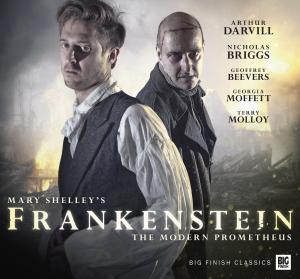Frankenstein Special Edition
Sunday, 30 August 2015 - Reviewed by
 Written By: Mary Shelley,
Written By: Mary Shelley,dramatised by Jonathan Barnes
Directed By: Scott Handcock
Cast: Arthur Darvill (Victor Frankenstein), Nicholas Briggs (Waldman/The Creature), Geoffrey Beevers (Alphonse Frankenstein/DeLacey), Georgia Moffett (Elizabeth), Terry Molloy (Christensen/Proprietor), Alex Jordan (Captain Robert Walton), Geoffrey Breton (Henry Clerval/Felix), Lizzie Hopley (Giselle/Agatha/Lorna), Stephen Fewell (Krempe/Judge/Kirwin), Sarah Ovens (Justine/Female Creature)
The drama is set out in 3 “volumes” and this, whilst surprising at first, mirrors the original novel's publication in 1818. This structure suits the story well, separating it into manageable sections and allowing listeners to take a break, if necessary. Moreover, it does seem to portray the fact that the author’s original intention was to have it be a short story, regardless of the fact that it was later expanded; it has the feeling of several stories woven together. The pacing of the story is not marred by slow segments, as there is a constant sense of anticipation to see what will happen next even if you know the rest of the story. The scenes and sequences flow well into each other, moving from the ship on which Victor tells his story to the various memories that come to him and serve as the main narrative device.
The musical score accompanying the cinematic sound design is well-suited, without being invasive. By far the most prominent piece of score is the main theme, a slow haunting orchestral cue, possibly representing the creature’s slow and complicated construction or “birth” as well as Victor Frankenstein’s inexorable journey towards self-ruin.
The casting of Brigs as both Waldman and the creature is intriguing due to the way events occur. His delivery change from the former to the latter makes for great dramatic effect, with every inflection bringing the pain and agony of the creature to bare on both the scientist who brought him into being and the listener.
Arthur Darville’s Frankenstein is well chosen also, with the writing portraying him not as the classical mad scientist hungry for power, but more as a man who is overcome by ambition and the drive to succeed. His interactions with the other characters, including the creature and the family’s servant are filled with emotion and his delivery, like Briggs and the rest of the cast, keeps the adaptation flowing towards what might be considered as an inevitable conclusion.
The ending of the final episode is not marked by the usual theme music from previous volumes or even an adapted version. In an interesting twist, the story simply ends with the ship’s captain making a speech stating that he and his men must go on through the raging storm, with the scene fading out into silence. In truth, whilst you might think that this wouldn’t work very well, it actually compliments the scene, as well as the action leading up to it, remarkably well. It allows the listener to reflect on the drama in general, as well as the notions expressed regarding industry, ambition and judgement. Moreover, the question of whether the captain actually stands by his word is also left unanswered.
The outtakes included as the final track were an interesting and amusing insight into the camaraderie of the cast. They clearly demonstrate
The sound design in this adaptation is of high quality, as usually expected by Big Finish in ranges like Doctor Who. The storm at sea and its desire to tear the ship asunder, to the one that marks the night when Frankenstein’s monster is brought into being, to the scenes in towns and cities. All convey the era in which the story takes place with great care.
All in all, the story is timeless and Big Finish have done their part to further cement it as a prime example of gothic literature in the minds of future generations. Regardless of whether you’ve listened to Big Finish’s work before, this one is sure to provide those new to audio dramas with a hard to beat introduction as to how enthralling they can be. With characters that are all brought to life with great aplomb by the actors and the aid of sound design and music that enhances the cinematic atmosphere, this might just be the best Frankenstein adaptation yet.





